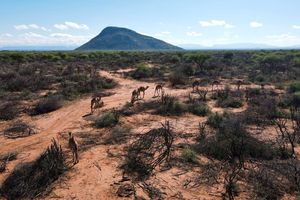
Camels graze in one of Northern Kenya Rangelands' carbon project conservancies. Judges have blocked the organisation's operations in two wards in Isiolo County.
Conservation group Northern Rangelands Trust (NRT) has failed in its bid in court to continue operating conservancies in Cherab and Chari wards in Isiolo County pending appeal on legality of creation of the wildlife establishments.
The group wanted the Environment and Lands court to suspend execution of a judgment issued in January this year declaring that establishment of the conservancies was unconstitutional.
The court had also been asked to set aside the judgment and reopen the dispute for fresh hearing by allowing two local groups, Biliqo Bulesa Community-Based Organisation and Cherab Community Conservancy, to represent residents’ views on conservation activities.
Through its Chief Executive Officer Tom Lalampaa, NRT implored the court to consider the public interest in wildlife conservation, adding that execution of the court’s verdict had potential financial and operational disruptions to the livelihood of the local community.
Mr Lalampaa said various multi-million shilling donor-funded development programmes, such as education bursaries for over 1,200 learners, healthcare, clean water provision and economic empowerment, were facing imminent closure.

Northern Rangelands Trust Chief Executive Officer Tom Lalampaa.
But the court dismissed the applications and ruled that there were no exceptional and justifiable circumstances to reopen the case since officials of the two organizations were aware of the court proceedings.
“The judgment entered by the court was neither irregular nor improperly entered. Rather, it was a judgment delivered after an inter-partes hearing, with the full participation of all the parties involved, none of whom can be heard to say that their rights to fair hearing or administrative action were breached,” ruled the three-judge bench led by Justice Oscar Angote. The other judges were Charles Yano and Christopher Nzili.
The judges added that NRT failed to demonstrate the substantial loss it would suffer if the disputed verdict is implemented.
NRT had argued that unless execution was halted, its initiatives such as water provision, education and classroom development, primary healthcare, social enterprises, women empowerment, vocational training, and climate change mitigation would suffer.
“The court notes that the allegations raised by NRT constitute new information. The existence of various projects, as now alleged, had not been placed before this court in prior proceedings. As far as the court is concerned, only the conservancy headquarters existed on the property. This being so, NRT cannot now introduce new claims as a basis for seeking a stay of execution of the judgment,” the court ruled.
The judges explained that the principle of finality in litigation dictates that parties must present their entire case, including all material facts and evidence, at the appropriate stage of proceedings.
Unconstitutional acts
The effect of the judgment in this case was to stop unconstitutional acts and omissions found to have been committed, they explained.
“Even if there are projects as alleged which were never disclosed, this court would be sanctioning an illegality or unconstitutional acts if it were to accede to the request by the Respondents to stay its judgment,” the judges held as they dismissed the stay application.
“NRT has not demonstrated any substantial loss which was real, demonstrable, and not merely speculative.”
The disputed verdict dated January 24, 2025 led to issuance of several orders, including a permanent injunction prohibiting NRT and its partners from conducting any conservancy operations, including recruitment and deployment of rangers, in the affected areas in Merti sub-county.
Being dissatisfied with the orders, NRT applied for suspension of the judgment’s execution on grounds that various multi-million shilling donor-funded development programs were at risk of stalling.
Mr Lalampaa listed closure of health facilities, loss of bursary support and boreholes as some of the projects to be affected by implementation of the judgment.
He stated that NRT had facilitated various charitable initiatives on the suit property, including environmental conservation, education, access to clean water, healthcare and economic empowerment.

In their petition in the Environment and Land Court in Malindi, the Kidutani residents claim the re-adjudication process could disadvantage them and other beneficiaries.
He said in 2025 conservancy group had secured Sh91 million from bilateral donors within the international community to support development initiatives in Biliqo Bulesa and Cherab Community Conservancies.
Pleading for the stay of the judgment, Mr Lalampaa said the verdict caused unprecedented shock, apprehension and uncertainty.
This, he said, led to the donors threatening to freeze the already secured and desperately needed development funds channeled through NRT for the benefit of the suit land.
“Implementation of the judgment portends imminent damage and loss and will lead to the immediate halting of various projects. These include the operational borehole at Dhima Adho and entire water supply infrastructure at Qonohongura water point, used to pump water from Ewaso River to Biliqo Bulesa Conservancy, and Biliquo Bulesa Mararas Borehole which assures over 15,000 users of life sustaining water,” he explained.
Further, implementing the judgment would result in the closure of the health facility in Biliqo Bulesa Conservancy, which was constructed with Sh27.5 million from donor funding.
The facility includes a maternity wing, laboratory, dispensary and housing for health officers.
Another loss is a bursary support provided by NRT, amounting to Sh12.7 million will affect 605 secondary school students, 50 university students, and 80 college students in Biliqo Bulesa, as well as 625 students in Cherab.
The CEO noted that NRT has funded several community projects, including school administration blocks, classrooms and dining halls as well as vocational colleges with a cumulative value of over Sh10 million.











